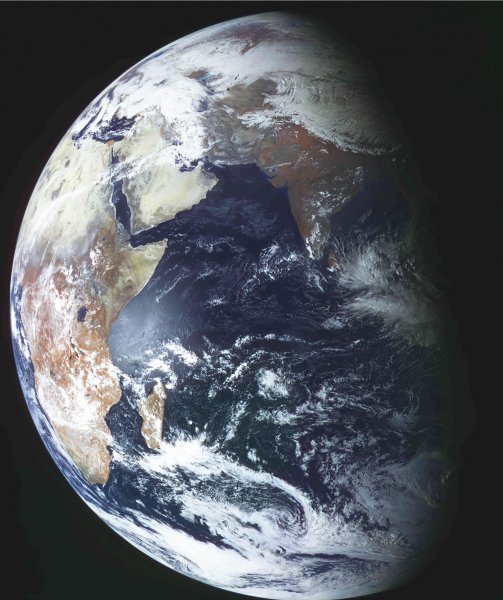How fast is the Earth travelling through space?

Brace yourself, because this question is a lot more complex than it sounds. We’re asking what the Earth’s speed is, but speed is always measured in relation to something and we usually use the Earth itself as the reference point. When we say a car is traveling at 120 km/h, we mean that it travels 120 km across the Earth in one hour and ignore the fact that the Earth itself is moving. In ordinary everyday situations, we simply assume that the Earth is our reference point for almost everything. We live on it, we move around on it, we anchor our houses in it, it is the centre of our world. But one of the most important things astronomers discovered hundreds of years ago was that Earth is not at the centre of the Solar System, but instead moves in an almost circular path around the Sun.
So we can rephrase the question as: “How fast does the Earth move around the Sun?” Well, we can figure this out with simple arithmetic. We know how far the Earth is from the Sun, and we know that it takes one year to make a complete circuit. We can calculate the distance traveled by the Earth in a year (If we draw a circle representing the Earth’s orbit, then the radius of that circle is the distance from Earth to Sun. If you’ve been to school, then you know that the circumference of a circle is 2πR). Speed equals distance divided by time, so by dividing the calculated circumference (in kilometers) by the number of hours in a year, we get a speed around the Sun of about 107,000 km/h.
More recently, astronomers learned another interesting fact. Despite the fact that it really looks as if we’re in the middle of the galaxy, the Solar System is actually nearer to the edge, and orbiting around the galactic core. By measuring the speed that other galaxies are moving towards or away from us, we can get a reasonable idea of our own orbital speed, which is about 230 km/s (or 828,000 km/h. Fast!). But we can’t just add this to Earth’s speed around the Sun, because we’re moving in circles – all we can say is that Earth’s speed around the galaxy is somewhere between 721,000 km/h and 935,000 km/h depending on the day of the year.
But we’re not done yet, because the Milky Way galaxy is not the centre of the Universe! Instead, it is just one member of a cluster of galaxies, known as the Local Group. Relative to the centre of this group, the Milky Way travels at about 40 km/s (144,000 km/h).
The Local Group cluster is part of a larger structure made of all the neighbouring clusters: The Local Supercluster. Relative to this, the local Group moves at about 600km/s (2.16 million km/h!).
So what is the Local Supercluster’s speed then? Well… that’s a problem. We haven’t yet seen what larger structure it might be part of, which we could use as a reference point. We can of course pick any old frame of reference, but it’ll be totally arbitrary. That speed could be anything from zero to almost infinity and it would be right for some frame of reference. The idea of an absolute speed, not relative to anything, is actually a meaningless concept – there’s no such thing. So… sorry! I can’t answer the question as phrased!
